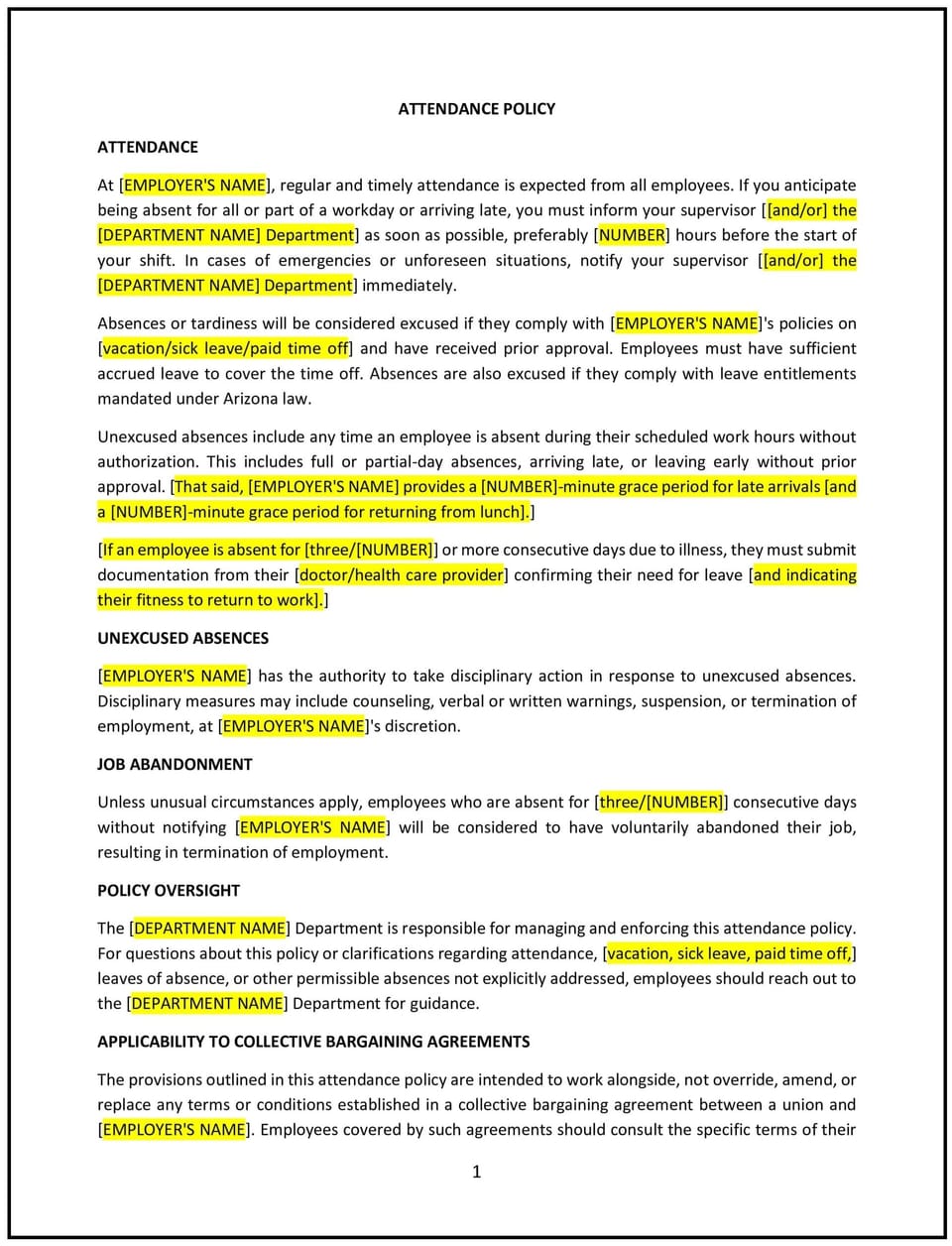Attendance policy (Arizona): Free template

Attendance policy (Arizona)
In Arizona, an attendance policy helps businesses establish clear expectations for employee attendance, ensuring consistency and operational efficiency. With unique challenges such as Arizona’s extreme weather, seasonal industries, and remote work arrangements, this policy ensures employees understand their responsibilities while providing flexibility to address local conditions.
This policy outlines guidelines for punctuality, procedures for requesting time off, and consequences for unexcused absences. By implementing this policy, businesses in Arizona can promote accountability and maintain a reliable workforce while supporting compliance with state and federal labor laws.
How to use this attendance policy (Arizona)
- Communicate expectations: Clearly define attendance standards, including work hours, acceptable tardiness, and procedures for reporting absences. Make sure employees understand these expectations to reduce misunderstandings.
- Address Arizona-specific needs: Adapt the policy to include provisions for challenges like extreme heat, monsoon season disruptions, or industries with variable schedules.
- Outline leave procedures: Specify the process for requesting leave, including how much notice is required and any necessary documentation for extended absences.
- Set consequences: Clearly explain disciplinary actions for frequent tardiness or unexcused absences, ensuring consistency and adherence to Arizona labor laws.
- Provide training: Educate employees and supervisors on the policy to ensure consistent application and understanding.
Benefits of using an attendance policy (Arizona)
A well-crafted attendance policy benefits Arizona businesses in several ways:
- Improves operational efficiency: Ensures teams function smoothly by reducing disruptions caused by absenteeism or tardiness.
- Supports compliance: Aligns with Arizona labor laws and federal requirements, minimizing the risk of disputes or penalties.
- Enhances accountability: Encourages employees to take responsibility for their attendance, fostering a culture of reliability and commitment.
- Promotes fairness: Establishes uniform attendance standards, ensuring all employees are treated equitably.
- Reduces business risks: Proactively addresses absenteeism and tardiness before they escalate into larger issues.
Tips for using an attendance policy (Arizona)
- Address seasonal challenges: Include provisions for industries with seasonal demands, such as agriculture or tourism, to accommodate workforce fluctuations.
- Provide flexibility: Allow for alternative work arrangements, such as remote work or adjusted schedules, to address Arizona-specific challenges like extreme weather or long commutes.
- Be consistent: Apply the policy uniformly to all employees to avoid perceptions of favoritism or unfair treatment.
- Regularly review the policy: Update the policy to reflect changes in Arizona labor laws or evolving business needs.
- Maintain records: Document attendance-related issues and any disciplinary actions to ensure transparency and legal compliance.
Q: How does this policy address weather-related absences in Arizona?
A: Employers can include provisions for extreme weather events, such as flexible schedules or remote work options, to ensure employees can safely meet attendance expectations.
Q: What should we do about employees with chronic attendance issues?
A: Implement a progressive discipline process, starting with verbal warnings, followed by written warnings, and ultimately termination if the problem persists.
Q: Can this policy accommodate remote workers?
A: Yes, it can include specific attendance expectations for remote workers, such as availability during work hours or participation in virtual meetings.
Q: How does this policy help with compliance?
A: By clearly outlining attendance expectations and aligning leave procedures with Arizona labor laws, the policy supports compliance and reduces the risk of disputes.
Q: Should seasonal businesses create different attendance rules?
A: Seasonal businesses can adapt their policies to account for irregular schedules or peak work periods while maintaining fairness and consistency.
This article contains general legal information and does not contain legal advice. Cobrief is not a law firm or a substitute for an attorney or law firm. The law is complex and changes often. For legal advice, please ask a lawyer.


